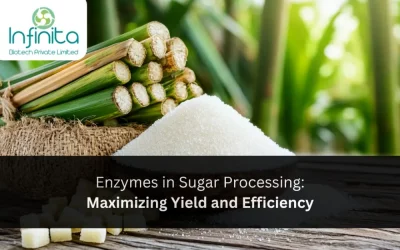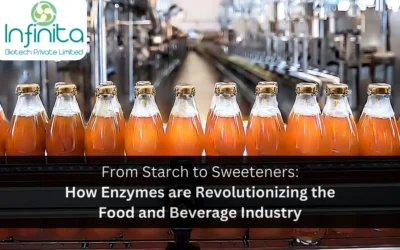Today, we are constantly seeking new ways to improve our health and well-being. From trendy diets to cutting-edge supplements, there seems to be no shortage of options. One often overlooked yet powerful tool in promoting good health is food enzymes. These microscopic proteins play a vital role in our bodies and can have surprising benefits for our overall well-being. In this article, we will explore the fascinating world of food enzymes and discover how they can revolutionize your health.
Understanding the Role of Food Enzymes in the Body
Have you ever wondered how your body breaks down the food you eat? Enter food enzymes. These remarkable catalysts are responsible for initiating and speeding up the breakdown of nutrients in your digestive system. Without them, our bodies would struggle to process food efficiently, leading to nutrient deficiencies and various health issues.
Food enzymes play a crucial role in ensuring that the nutrients from the food we consume are properly broken down and absorbed by the body. This process is essential for maintaining overall health and well-being, as it provides the necessary building blocks for various bodily functions.
The Science Behind Food Enzymes
To truly appreciate the power of food enzymes, it’s essential to understand their scientific basis. Enzymes are specialized proteins that facilitate chemical reactions in living organisms. In the case of food enzymes, they are specifically designed to break down complex molecules found in our diet, such as carbohydrates, proteins, and fats.
These enzymes work in a highly specific manner, targeting particular types of nutrients based on their molecular structure. For instance, lipase is an enzyme that focuses on breaking down fats, while lactase targets lactose, the sugar found in dairy products. This specificity ensures that each type of nutrient is efficiently processed during digestion.
How Food Enzymes Work in Digestion
When you consume food, your body produces different types of enzymes to aid in the digestion process. For example, amylase breaks down carbohydrates, while protease breaks down proteins. These enzymes act like tiny scissors, cutting larger molecules into smaller, more easily absorbable pieces.
Once the food is broken down into its building blocks, such as simple sugars, amino acids, and fatty acids, your body can absorb and utilize them to fuel various bodily functions. Without food enzymes, this process would be slow and inefficient, hindering nutrient absorption and potentially leading to digestive discomfort.
It’s fascinating to think about the intricate dance of enzymes and nutrients that takes place every time we eat. This harmonious process ensures that our bodies receive the essential components needed to thrive and function optimally.
The Health Benefits of Food Enzymes
Now that we understand the crucial role of food enzymes in digestion, let’s explore the surprising ways they can revolutionize your health.
Food enzymes play a vital role in the breakdown of food in the digestive system. They are responsible for breaking down complex nutrients into simpler forms that the body can absorb and utilize. This process is essential for extracting the maximum nutritional value from the foods we eat, ensuring that our bodies receive the necessary vitamins, minerals, and other essential nutrients for optimal functioning.
Boosting Nutrient Absorption with Food Enzymes
One of the most significant benefits of food enzymes is their ability to enhance nutrient absorption. When your body efficiently breaks down food into its component parts, it can extract the maximum amount of essential vitamins, minerals, and other nutrients. This improved absorption can contribute to better overall health and may help prevent nutrient deficiencies.
Furthermore, proper nutrient absorption is not only crucial for physical health but also plays a significant role in mental well-being. Nutrients like omega-3 fatty acids, B vitamins, and antioxidants are essential for brain function and mood regulation. By aiding in nutrient absorption, food enzymes support cognitive function and emotional balance.
Food Enzymes and Gut Health
Another surprising benefit of food enzymes is their positive impact on gut health. Your gut houses trillions of bacteria that help break down and digest food. However, an imbalance in the gut microbiota can lead to digestive issues like bloating, gas, and constipation. By supporting efficient digestion, food enzymes can help maintain a healthy balance of gut bacteria, promoting optimal gut health.
Moreover, a healthy gut is closely linked to a robust immune system. The digestive tract is a significant site of immune activity, and maintaining a diverse and balanced gut microbiome is essential for supporting immune function. Food enzymes aid in the digestion process, ensuring that the gut environment remains conducive to beneficial bacteria growth and overall immune health.
Incorporating Food Enzymes into Your Diet
Are you now curious about how to incorporate food enzymes into your diet? Fortunately, nature has provided us with many enzyme-rich foods that we can easily include in our meals.
Enzymes play a crucial role in the digestion and absorption of nutrients in our bodies. They help break down food into smaller molecules that our bodies can absorb more easily, aiding in overall digestion and nutrient uptake. By incorporating enzyme-rich foods into your diet, you can support your body’s natural digestive processes and potentially improve your overall health.
Identifying Foods Rich in Enzymes
Fresh fruits and vegetables are excellent sources of food enzymes. Papaya and pineapple, in particular, contain specific enzymes like papain and bromelain, respectively, which aid in protein digestion. Other enzyme-rich foods include kiwi, mango, avocado, fermented vegetables, and sprouted grains.
It’s important to note that different enzymes serve different functions in the body. For example, proteases help break down proteins, lipases aid in fat digestion, and amylases assist in carbohydrate breakdown. By consuming a variety of enzyme-rich foods, you can ensure that you are supporting the digestion of a wide range of nutrients.
Tips for Increasing Enzyme Intake
To maximize enzyme intake, consider consuming these foods raw or lightly cooked. Heat can destroy some enzymes, so enjoying them in their natural state will ensure you receive their full benefits. Additionally, incorporating fermented foods into your diet, such as sauerkraut or kimchi, can provide a natural source of enzymes and beneficial bacteria for your gut.
Another way to boost your enzyme intake is by including sprouts in your meals. Sprouts are germinated seeds that are packed with enzymes to support their growth process. When consumed, these enzymes can also aid in digestion and provide additional health benefits. Adding sprouts to salads, sandwiches, or smoothies can be a simple and nutritious way to increase your enzyme consumption.
The Potential Risks of Enzyme Deficiency
While food enzymes offer tremendous health benefits, it’s essential to be aware of the potential risks associated with enzyme deficiency.
Enzymes play a vital role in the digestion process, breaking down food into nutrients that our bodies can absorb and utilize. Without sufficient enzymes, the body may struggle to extract essential vitamins, minerals, and other nutrients from the foods we eat, leading to a range of health issues.
Recognizing Signs of Enzyme Deficiency
Indigestion, bloating, and gas after meals are common signs of enzyme deficiency. If you often experience these symptoms, it might be worth considering if inadequate enzyme production is to blame. Additionally, nutrient deficiencies, weight gain, and fatigue could indicate an impaired ability to break down and absorb essential nutrients.
Moreover, enzyme deficiencies can also manifest in less obvious ways, such as skin problems, joint pain, and frequent infections. These symptoms may not always be directly linked to digestion, making it crucial to consider enzyme levels as a potential underlying issue.
Health Issues Linked to Low Enzyme Levels
Untreated enzyme deficiencies can lead to more severe health issues over time. Prolonged nutrient malabsorption can contribute to chronic digestive disorders, weakened immune function, and even increased susceptibility to certain diseases. Therefore, addressing enzyme deficiencies proactively is crucial for maintaining optimal health.
Furthermore, low enzyme levels can impact mental health as well, with studies suggesting a potential link between enzyme deficiencies and conditions like anxiety and depression. The gut-brain connection highlights the importance of proper digestion not only for physical well-being but also for mental and emotional health.
The Future of Food Enzymes in Health and Wellness
The impact of food enzymes on health and wellness is a growing area of research. Scientists continue to uncover their potential in various applications, from improving digestive health to managing chronic conditions.
Ongoing Research on Food Enzymes
Researchers are exploring how food enzymes could benefit individuals with specific dietary needs or conditions. For instance, individuals with lactose intolerance may find relief with lactase supplements, which help break down lactose, the sugar found in dairy products. This ongoing research opens exciting possibilities for personalized enzyme therapy.
The Growing Popularity of Enzyme Supplements
As awareness of food enzymes’ benefits increases, so does the popularity of enzyme supplements. These supplements provide a concentrated dose of specific enzymes to support digestion and nutrient absorption. However, it’s essential to consult with a healthcare professional before incorporating supplements into your routine to ensure they are suitable for your individual needs.
In conclusion, food enzymes are a hidden powerhouse in promoting good health. From aiding in digestion and nutrient absorption to supporting gut health, their benefits are far-reaching and, at times, surprising. By incorporating enzyme-rich foods and addressing any potential deficiencies, you can harness the power of food enzymes to revolutionize your health and live your best life.







